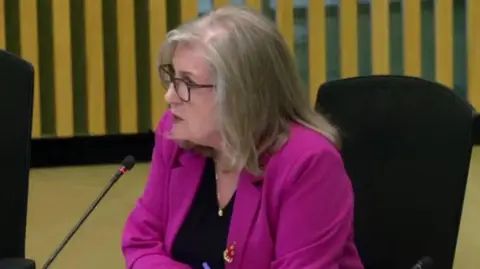Justice Dept. Joins Lawsuit to Challenge California’s New Redistricting Maps

© Gabriela Bhaskar/The New York Times

© Gabriela Bhaskar/The New York Times

© Adrian Wyld/The Canadian Press, via Associated Press
Elinor Fettiplace (c.1570 – in or after 1647) was an English cookery book writer. Probably born in Pauntley, Gloucestershire into an upper-class land-owning farming family, she married into the well-connected Fettiplace family and moved to a manor house in the Vale of White Horse, Berkshire. In common with many ladies of the Elizabethan era, Fettiplace wrote a manuscript book with details of recipes for dishes and meals, medical remedies and tips for running the household. She dated the work 1604, but it is possible that she began writing it several years earlier, when she was still living with her mother. The book was passed down through her family, initially to her niece, until it was handed to the husband of the twentieth-century writer Hilary Spurling. Fettiplace's husband died in 1615; she moved back to Gloucestershire and married a local man, Edward Rogers, who died in 1623. She lived until at least 1647. (Full article...)
November 14: World Diabetes Day; Dobruja Day in Romania

King Christian IX of Denmark, known as the "father-in-law of Europe", ruled Denmark from 1863 to 1906. He and his queen consort, Louise of Hesse-Kassel, became the ancestors of many members of European royalty. Christian and Louise had three sons and three daughters together. Although Christian had an affectionate relationship with his daughters, he rejected his eldest son, Frederick, over political differences. After the start of Christian's reign as King of Denmark, Louise helped marry their children into royal families across Europe, including their daughter Princess Alexandra with Albert Edward, Prince of Wales, and their daughter Princess Dagmar with Alexander, Tsarevich of Russia. Some of Christian and Louise's grandchildren became monarchs themselves. For example, Constantine I, Nicholas II, and George V reigned over Greece, Russia, and the United Kingdom, respectively. (Full list...)

The Czapski Palace is a palatial complex in the center of Warsaw, Poland. It was constructed in about 1686 for the country's Catholic primate, Michał Stefan Radziejowski, using a design by Dutch-born Polish architect and engineer Tylman van Gameren. The palace was reconstructed between 1712 and 1721, and acquired its present rococo character in 1752–65. The building has been home to various notable individuals, including artist Zygmunt Vogel, composer Frédéric Chopin, and poets Zygmunt Krasiński and Cyprian Norwid. It now houses the Academy of Fine Arts. This photograph shows the front façade of the Czapski Palace's main building.
Photograph credit: Adrian Grycuk

 Getty Images
Getty ImagesNo-fault evictions will be outlawed in England from 1 May, the government confirmed, as it set out the timeline for sweeping renters' reforms.
The changes also see the end of fixed-term tenancy contracts, as renters move onto so-called "rolling" agreements, as well as an end to "bidding wars" and clearer rules on having pets.
Landlords have said the reforms would increase the screening of prospective tenants and have spoken of nervousness around what happens when tenancies go wrong.
Housing Secretary Steve Reed said the government was "calling time" on "rogue landlords" by initiating a raft of measures in the Renters' Rights Act.
"We're now on a countdown of just months to that law coming in - so good landlords can get ready and bad landlords should clean up their act," he added.
Shadow housing secretary Sir James Cleverly said the reforms "will drive landlords from the market, reduce supply and send prices up for tenants".
He said that, "with a start date of May 2026, we are now set for a six-month fire sale with tenants forced out at short notice".
Approximately 4.4m households in England rented from a private landlord between 2021 to 2023. The new rules will affect more than 11 million people.
The Renters' Rights Act - described as the biggest shake-up to renting in England for more than 30 years - was formally approved at the end of October.
While many renters welcomed the introduction of the timeline, some landlords expressed concern about the speed of the changes.
Ben Beadle, chief executive of the National Residential Landlords Association, said the deadline alone to implement the changes is "not enough".
He added: "We have argued consistently that landlords and property businesses need at least six months from the publication of regulations to ensure the sector is properly prepared for the biggest changes it has faced for over 40 years."
From May, properties will be rented on a "periodic" or rolling basis, rather than under a fixed 12 or 24-month contract.
Tenants who want to leave can give two months' notice, which the government says will prevent tenants paying rent for substandard properties.
Landlords will no longer be able to evict tenants for complaining about poor conditions.
More than 11,000 households in England had their homes repossessed by bailiffs following a section 21 eviction in the year to June.
Victoria, 25, had to suspend studying for her degree after she received a section 21 eviction notice in March.
She was living in Durham while studying at the University of Northumbria and believes the eviction was partly due to complaints about the property's condition.
"I ended up having no choice but to move back in with my parents and I was devastated."


Kerrie Portman, 27, became homeless after reporting significant mold in her Cambridgeshire flat to environmental health in 2020.
The council placed her in temporary accommodation while the landlord was told to address the issue, but she was still stuck paying rent.
She said: "I think it's outrageous that the landlord continued to charge me full rent... ultimately, he didn't really face any obstacles."
A few weeks after she moved back in, she was given a section 21 notice, making her homeless. She would nap in public bathrooms, sleep on long bus routes and shower at her gym.
"I think it's so ridiculous that your whole safety net and foundation can be pulled away on a whim of the landlord," Kerrie said.


Ten households in Hackney, East London, in houses that are all owned by the same landlord, said they had recently been issued with section 21 notices without reason.
One of the affected tenants, who did not want to give her name, said she was "really panicking".
"We were looking for a place this time last year and it took us three to four months to find one," she said.
The government confirmed that all section 21 notices issued before May will stand, but it said landlords must begin court repossession proceedings by 31 July 2026.
The overhaul of the current system means that, from 1 May, landlords will only be able to evict tenants in certain circumstances: if tenants damage a property, commit antisocial behaviour, or fall significantly behind paying the rent.
Maureen Treadwell contacted BBC News with concerns about the new law. Her family rent out 10 properties in Hampshire.
"There are draconian fines if you get things wrong, so the whole thing feels anti-landlord," she said.
She raised her fears that, without reforms to the court system making it quicker to evict bad tenants, there will be an exodus of people who want to let their homes.
"Is it worth letting your house and then having a court fight to recover it, or a one-year delay? It's not worth it. So it will end up making the housing crisis worse."


Reed told the BBC he was "working with the Ministry of Justice to look at how we can ensure that there are not undue delays" in situations where a landlord wanted to evict a tenant who was misbehaving.
In addition, landlords will be able to evict tenants if they want to sell or move into the property but not in the first 12 months after a tenancy begins.
The new laws also include banning bidding wars and discrimination of parents and those on benefits, as well as setting out a clearer process for those renting with pets.
Many renters' groups have welcomed the changes. The Renters Reform Coalition - which includes Shelter, Generation Rent and Citizens Advice - says section 21 is "a huge issue".
"It is not the prospect of giving renters these vital rights that is fuelling record homelessness, but the gross injustice of no-fault evictions," said Shelter's Mairi MacRae.
The Renters' Rights Act applies to England. Scotland abolished no-fault evictions in 2017, but Wales and Northern Ireland still have no-fault evictions under something similar to section 21. In 2022, Wales increased the notice period for these to six months.

 London Assembly
London AssemblyThe Metropolitan Police is investigating "tens" of group-based child sexual abuse cases involving what could be described as grooming gangs, the force's commissioner has said.
An initial data search identified around 9,000 historic cases that might fall under the broad national criteria, but after reviewing 2,200 of them only about 1,200 remained in scope, Sir Mark Rowley told the London Assembly.
The commissioner warned against using "grooming gangs" as a catch-all term because offending includes abuse within families, in institutions, between peers and online.
He said the ethnicities of suspects varied and are "reflective of the diversity we see in the city".
During Thursday's meeting, the police commissioner set out details of a national review of child exploitation cases, which has prompted recent political debate.
Sir Mark said a data search had initially identified about 9,000 historic cases in London that might fall under a national definition of group-based sexual offending, which includes any case with two or more suspects and at least one victim.
He also said that figure had been widely misinterpreted as 9,000 grooming gang cases and had led to "unbalanced reporting".
He said the definition used by the national audit was far broader than the public understanding of grooming gangs and covered intra-familial offending, institutional abuse, peer-on-peer cases and online exploitation.
He told the assembly that after reviewing 2,200 of the 9,000 cases, around 1,200 remained in scope and that the number would continue to fall as the work progressed.
The commissioner said that once the initial assessment was complete, the Met expected "maybe 2,000 or 3,000 cases" to be considered for possible reinvestigation, but stressed this would still cover a wide mix of offending types, not solely grooming gangs.
"We do not see the typology reported elsewhere where there have been cases of offending committed by groups of Pakistani men on white British children being the sole or majority case," added Sir Mark.
He also said the Met recorded around 2,000 sexual offences a month, about half of which involved child sexual abuse, and warned that managing current cases alongside historic ones would require extra funding and specialist officers.
"It is important for us to use precise language and consider its impact on victims and public understanding. There is too much ready reach to simplistic analysis which risks misleading communities," he said.

 Getty Images
Getty ImagesSir Mark's comments came during a meeting in which London Mayor Sir Sadiq Khan was accused of "taking the mickey" out of victims after previously saying there was "no indication of grooming gangs" operating in the capital.
Susan Hall, Conservative group leader, said: "In January, I asked if we had grooming gangs in London. You dismissed my question by pretending you didn't know what I meant."

 London Assembly
London AssemblySir Sadiq responded by clarifying "what is meant by grooming gangs", according to the national inquiry announced by Prime Minister Sir Keir Starmer in June, and outlined the support provided to victims.
The mayor told the assembly that London had "issues in relation to child sexual exploitation" and "child sexual abuse", but that these cases were different to those seen elsewhere in England.
"I've led efforts to strengthen the protection of children and those exploited by abuse and exploitation," he said.
Listen to the best of BBC Radio London on Sounds and follow BBC London on Facebook, X and Instagram. Send your story ideas to hello.bbclondon@bbc.co.uk

 BBC
BBCEastEnders favourite Pat Evans, formerly Pat Butcher, is to return to the BBC soap for a one-off episode over the Christmas period.
The character, played by Pam St Clement, was beloved by viewers for more than 25 years for her no-nonsense personality and memorable taste in earrings.
Pat died in 2012, but was later seen on-screen again with Dame Barbara Windsor, when she returned as a figment of the dying Peggy's imagination in 2016.
She will now similarly come back, acting alongside Paul Bradley, as Nigel, whose memories take him back to the 90s, as part of a storyline about his dementia next month.
"I was both surprised and excited to be asked back to tread the streets of Walford once again and to be involved in Nigel's touching dementia storyline," St Clement, 83, said.
"It was lovely to be welcomed back by those with whom I had worked for so long. It was just like coming home."
Pat returns to help Nigel when his dementia symptoms intensify, following an emotional evening at his festive film screening.
St Clement first appeared in EastEnders in 1986 and was at the heart of the drama in Albert Square until her character's death.


EastEnders executive producer Ben Wadey said: "It's an honour and a privilege to welcome Pam St Clement back to EastEnders for a special episode in Nigel's ongoing dementia storyline.
"Pat Evans is one of the most cherished and iconic characters to have graced the streets of Walford, and I know I speak on behalf of everyone when I say what a delight it was to see Pat and Pam back in The Queen Vic, as she helps Nigel in his time of need."
Pat is one of a number of classic characters who have made a return to Walford.
Anita Dobson's Queen Vic landlady Angie Watts made a surprise return to visit her daughter Sharon, as she drifted in and out of consciousness in the show's 40th anniversary episode in February.
Cindy Beale (Michelle Collins) and Zoe Slater (Michelle Ryan) are back in the Square, while Grant Mitchell (Ross Kemp) and Chrissie Watts (Tracy-Ann Oberman) made recent short-term comebacks.

© Jason Henry for The New York Times

© Hiroko Masuike/The New York Times

© Angelina Katsanis for The New York Times

© Tierney L. Cross/The New York Times

 EPA
EPAGermany's coalition government has agreed a new military service plan to boost troop numbers following months of wrangling between political forces.
The new military service plan will mandate all 18-year-old men to fill out a questionnaire on their suitability to serve and, from 2027, to undergo medical screening.
The decision comes as Berlin aims to create Europe's strongest conventional army.
The boss of Germany's biggest defence firm, Rheinmetall, has told the BBC he believes that target could be met in five years.
Armin Papperger said Chancellor Friedrich Merz's aim to boost the Bundeswehr was "realistic" and he told the BBC that "clear decisions" were coming from government.
Earlier this year German defence chief Gen Carsten Breuer warned that the Western Nato alliance had to prepare for a possible Russian attack within four years.
Mr Papperger said he had "no glass ball" about the future but agreed Germany had to be "ready in '29".
When they formed a coalition earlier this year, Merz's conservative CDU/CSU and the centre-left Social Democrat SPD agreed to re-introduce military service which would be voluntary "to start with".
The Bundeswehr currently has around 182,000 troops. The new military service model aims to increase that number by 20,000 over the next year, rising to between 255,000 and 260,000 over the next 10 years, supplemented by approximately 200,000 reservists.
From next year, all 18-year-old men and women will be sent a questionnaire to assess their interest and willingness to join the armed forces. It will be mandatory for men and voluntary for women.
From July 2027 all men aged 18 will also have to take a medical exam to assess their fitness for duty.
If the government's targets are not met, a form of compulsory enlistment could be considered by parliament. If war were to break out, the military would be able to draw on the questionnaires and medical exams for potential recruits.
Some within Germany's political left remain deeply opposed to mandatory service.
Many young Germans are wary and a significant majority oppose it. A recent Forsa survey for Stern magazine suggested while just over half of respondents favoured compulsory service, opposition rose to 63% among 18- to 29-year-olds.
"I don't want to go to war because I don't want to die or I don't want to be shot at," said Jimi, a 17-year-old student from Berlin, who attended an anti-conscription protest outside the Bundestag earlier this week. "I also don't want to shoot people."
An attack against Germany was an "unlikely and abstract scenario" that the government was using to legitimise "stealing millions of young people's right to decide what they should be doing", he said.
Meanwhile, 21-year-old Jason signed up as new Bundeswehr recruit earlier this year because of the current "security situation".
"I wanted to contribute to defend peace, to defend democracy if the worst happens," he said. By joining up he felt he was "giving back to society" but also believed in the deterrent potential of the army, "so potential enemies don't even think about attacking you".


Defence Minister Boris Pistorius has sought to reassure Germans, saying that despite the new military service plan there was "no cause for concern... no reason for fear".
"The more capable of deterrence and defence our armed forces are, through armament through training and through personnel, the less likely it is that we will become a party to a conflict at all," Pistorius said.
Defence spending in Germany tumbled after the end of the Cold War, while conscription was suspended in 2011.
Given its past, Germany has long been shy of showing military might, but earlier this year Friedrich Merz announced that the rule for German defence "now has to be whatever it takes", following Russia's full-scale invasion of Ukraine.
Nato countries across Europe have come under pressure from President Donald Trump's White House to hike spending.
European moves to re-arm have meant significant revenue for Rheinmetall.
Its CEO, Armin Papperger, whose firm also supplies Ukraine, said: "We make a lot of money because there is a huge demand."
"We have to grow strong on vehicles, on ammunition, we have to have our own satellite competencies. We do much more on the electronics and artificial intelligence... than ever before," he said.
A US report last year suggested the Rheinmetall boss had been the target of a Russian assassination plot. There was no confirmation at the time and Mr Papperger would not be drawn on the report, saying: "I feel good, I feel safe."
Asked about whether he felt Europe was in a state of a cold or hybrid war, he said: "Whatever you call it, it's not a peaceful time."


© Go Nakamura for The New York Times

© Pete Marovich for The New York Times

© Eugene Gologursky/Getty Images

© Patrick Semansky/Associated Press

© Nick Oxford/Reuters

© The New York Times

法国司法当局正在考虑安排2015年发生的巴黎1113恐袭击事件的受害者与罪犯萨拉赫·阿卜杜勒萨拉姆 (Salah Abdeslam) 会面。那么,所涉及的这项修复性司法程序是如何运作的呢?在接受法兰西新闻电台 (franceinfo), 采访时,对巴黎1113恐怖袭击事件负有责任的最后一名幸存恐怖分子的律师表示,她的当事人希望与他被判犯有罪行的恐怖袭击事件的受害者家属见面。
萨拉赫·阿卜杜勒萨拉姆 (Salah Abdeslam)会见巴黎1113恐袭事件遇难者家属吗?据他的律师奥利维亚·罗南Olivia Ronen 称,这位袭击突击队最后一位幸存成员“希望能够解释情况,进行讨论,并为相关各方敞开大门,如果他们愿意谈论拘留和审判事宜的话。”
因此,萨拉赫·阿卜杜勒萨拉姆愿意采取那项修复性司法的途径,而这种司法途径目前从未在恐怖主义案件中使用过。所谓恢复性司法措施是指允许犯罪的受害者和犯罪者积极参与解决犯罪造成的困难,特别是修复犯罪造成的任何损害的任何措施
在巴黎1113恐袭事件的庭审中,巴塔克兰剧院 (Bataclan )遇难者之一的父亲乔治·萨利内斯向特别重审法庭提出了这一想法。受害者协会“巴黎生命”(LifeforParis)主席亚瑟·德努沃 (Arthur Dénouveaux )在脸书X上发帖证实,“多名受害者对修复性司法感兴趣”。
什么是修复性司法?修复性司法的概念在电影《我将永远看到你们的脸庞 (Je verrai toujours vos visages ) 》中得到重点阐述,并于2015年在法国开始实施。它被视为对刑事司法系统的补充手段,其原则是允许受害者或民事当事人与犯罪者会面。
据司法部称,由经过专门培训的中立调解员主持的保密谈话会议旨在“帮助受害者重建生活,追究犯罪者的责任,并帮助他们重新融入社会”。
严格的实施条件: 修复性司法只能在特定条件下实施,尤其要避免加剧受害者的创伤。例如,只有在加害者承认事实,且任何一位参与者都可以随时制止的情况下,才能进行这项修复性司法。
司法部表示:“它可以在刑事诉讼的各个阶段实施:审判前、审判中或审判后,甚至在没有起诉的情况下也可以实施。”
司法部还澄清说:“它的进展、成功或失败与司法判决无关。”
个人主动性的过程
要实现修复性司法,必须源于“个人自愿主动性”。民事当事人或受害者应联系相关法院的受害者援助办公室 (BAV)。他们也可以联系支持受害者的组织或拨打 116 006,该热线会将他们转接给专业人士。
如有需要,修复性司法可以采取以下四种形式:
- 修复性调解:
在这种修复性司法模式下,加害者和受害者在事先进行过访谈的调解员的协助下进行对话,旨在讨论所犯罪行、其后果以及在各个方面的影响。司法部澄清道:“实体会面并非强制性的。”
- 修复性会议:
这种版本类似于修复性调解,但涉及加害者和受害者的亲属参与讨论。
- 囚犯与受害者会面(RDV):
在这个版本中,类似案件的受害者和加害者会面地点在监狱内。这项修复性司法项目为期三个月。每次会议都围绕一个不同的主题展开讨论
- 罪犯与受害者会面(RCV):
这个版本与 RDV 相同,只是会面地点不在监狱。
超过300个修复性司法程序被启动
虽然这些方法在法国尚未像在英国或加拿大那样普及,但它们正开始兴起。法国修复性司法研究所(IFJR)报告称,已有超过300人启动了修复性司法程序,而2023年这一数字约为150人。

巴黎恐怖攻击事件届满十周年,法国于本周举行全国悼念活动。尽管法国驻美大使馆在社交平台上发文追思,美国官方未对相关纪念活动或法国反恐情势发表公开评论。然而,在美国网络社群上,仍有民众回忆当年那一夜的震撼。
法国驻美大使馆13日于社交平台贴文指出:“#13November。10年前法国恐怖攻击,超过130人失去生命,超过500人受伤。”贴文配图写着:“10年之后,法国向巴黎攻击的受难者致敬。”记者分别致信白宫、国务院及法国驻美大使馆请求评论,但至截稿前均未获回复。
2015年11月13日,9名伊斯兰国(ISIS)成员在巴黎多处地点发动攻击,目标包括法兰西体育场、街头咖啡馆与Bataclan音乐厅,造成130人丧生、逾400人受伤。这场事件被视为法国近代史上最严重的恐怖攻击,也对欧美安全政策产生长远影响。
对许多美国人而言,巴黎恐攻并非遥远的欧洲事件,而是一段共同的记忆。当年通过即时新闻与社群平台传遍全球的影像,使人意识到恐怖主义已不再受地理界线限制。
在Reddit论坛上,一名网民回忆:“我当时在多伦多念大学,看着体育场外发生的第一起事件报道,接着又看到巴黎各地传来更多消息……那种残酷与冷血令人恶心。我相信那一夜改变了整个西方世界,我们至今仍在承受那晚带来的政治与文化分裂。”
另一位住在明尼苏达州的网民则写道:“真难相信已经十年了。那时我刚上大学,原本要出门参加派对,结果和朋友坐在宿舍里,看着新闻,一言不发。那是我永远不会忘记的一刻。”
2015年后,西方各国安全机构普遍加强对“本土化极端主义”(homegrown extremism)的关注,并推动在社群平台上的宣传监测与去极端化措施。美法两国此后在网络舆情分析、社群激进化防范与暴力极端主义应对方面持续合作。
根据美国国务院《2023年恐怖主义报告》,法国是美国在全球反恐合作中的“关键伙伴”。报告指出,法国的恐怖主义威胁在2023年维持“非常高”水准,并于10月提升至最高警戒层级“紧急攻击状态”,原因是北部城市阿拉斯(Arras)发生教师遇袭案。法国安全部门警告,单独行动者与小型激进细胞已成为欧洲最显著的恐怖主义威胁。
报告同时指出,自2013年以来,法国安全部门已阻止至少73起恐怖攻击企图,其中43起发生于2017年之后。法国亦与美国保持密切情报交流,并在金融制裁领域合作打击恐怖组织资金流向。2023年10月以色列—哈马斯冲突爆发后,法国金融情报单位Tracfin加入“反恐融资特别工作小组—以色列”,以加强全球恐怖资金监控。2023年度报告是国务院最近期的资料。
在太平洋彼端,巴黎当地则举行多场悼念仪式。法国总统马克龙(Emmanuel Macron)与巴黎市长伊达戈在新落成的纪念花园内献花,园内刻有所有罹难者姓名。巴黎铁塔于夜间点亮蓝、白、红三色灯光,全城多处举行默哀活动。

包括法国巨头威立雅(Veolia)在内的欧洲多家塑料回收企业周四(11月13日)联合发出警告:欧洲塑料回收产业正面临严重危机。他们呼吁欧盟立即出台紧急措施,避免回收产业在廉价中国产新塑料的冲击下继续萎缩。
法新社报道,威立雅代表表示,欧洲在全球气候峰会( COP30 )上不断做出高目标承诺,但回收产业却在“被放任衰退”。过去三年,全欧已有约30家回收厂关闭,回收产能减少近百万吨。
业界指出,危机的关键来自“需求不足”。原因是中国近年来大量新增原生塑料生产线,使新塑料价格大幅下跌。目前市场价格差距明显:新塑料每吨约 800 到 900 欧元;而回收塑料却要 1,800 欧元,几乎贵上一倍。
在这样的竞争下,欧洲回收厂难以维持运作。业者指出,过去五年,不论新塑料还是回收料,欧洲从亚洲进口的塑料材料已增加一倍,竞争尤以来自中国最为强烈。
为让市场恢复平衡,威立雅与欧洲塑料回收商协会要求欧盟扩大“强制回收含量”的法规,不只限于以 PET(聚酯)为材质的饮料瓶,也延伸到更多塑料种类,包括汽车工业使用的塑料。
欧盟预计在 2026 年底提出新的资源循环立法方案。不过由于情况紧急,欧盟最快可能在今年12月就讨论首批应对措施。
现行法规规定,PET瓶至少要含有25%的回收塑料,四年后提高到30%。业者则希望欧盟把目标提高到 2027年35%,并促成更多行业必须强制使用回收塑料。
如果没有更强的政策支持,欧洲回收业者担心,将有更多工厂被迫关闭,而欧盟的环保与再生塑料目标也可能因此落空。

美国政府周四(11月13日)宣布,将活跃于德国、意大利和希腊、以“反法西斯”(Antifa)为名的若干运动列为“恐怖组织”,此举属于美国总统特朗普对“安提法”势力全面施压行动的一部分。
法新社报道,美国总统特朗普今年9月签署行政令,正式将“安提法”定性为“恐怖组织”,行政令签署时间恰逢美国极右网红查理.柯克(Charlie Kirk)遇刺身亡、官方举行悼念仪式的翌日。
据美国国务卿鲁比奥周四发表的声明,美国此次指定的对象包括总部位于德国的"安提法东部组织"(Antifa Ost),以及意大利与希腊的三个组织。自11月20日起,这些团体将被列为“外国恐怖组织”。
声明指出,“安提法东部组织"(Antifa Ost )自2018年至2023年在德国发动多起袭击,目标为其认定的‘法西斯分子’,该组织被指控于2023年在匈牙利实施攻击行动。”
匈牙利在今年9月已跟随美国,将“安提法”列为恐怖组织。
其他被点名的组织包括: 意大利的无政府主义联盟 FAI/FRI,希腊的两个无政府主义团体。
美国国务院称,这些被列名的组织“奉行无政府主义或革命马克思主义理念,秉持反美、反资本主义和反基督教立场,并以此煽动或为其在美国及海外的暴力行为辩护。”
根据美国法律,团体一旦被指定为“外国恐怖组织”,其成员将被禁止入境美国,他们在美国境内的所有资产将被冻结,同时任何个人或机构向其提供物质支持都属违法行为。

德国联邦议会周四(11月13日)任命一个专家委员会,全面重审德国对中国的贸易政策。在北京收紧稀土出口、暴露德国工业供应链可被迅速“卡脖子”之后,柏林正加速推动“降低对华风险”(de-risking)战略。
路透社报道,这个委员会由工业协会、劳工团体及智库组成,与2023年上一届政府推出、但仅提出原则性建议的《中国策略》不同,新的委员会将向德国政府提出具有可操作性的政策建议,并为未来立法提供依据。
据德国政府称,委员会将重点审查能源与原材料进口、关键基础设施中的中国投资等敏感议题。在该委员会设立之际,德国财政部长克林贝尔(Lars Klingbeil)即将访华,希望向中方阐明欧盟在多项议题上的立场。
德国今年在对最大贸易伙伴中国的关系上尤其感受到压力。一方面,美国总统特朗普推出新一轮高额关税冲击全球贸易;另一方面,中国则以出口管制展现反制能力。
德国经济研究所(IW)国际经济政策主管马特斯(Jürgen Matthes)直言:“在关键领域,中国既有能力、也可能随时切断供应,而德国对此仍显得过于脆弱。如今推动改革的压力比以往任何时候都要大。”
外交访问受阻 德方“风险管理”意识升高
克林贝尔将成为德国新政府中首位访华的部长。新任外长瓦德富尔(Johann Wadephul)原订10月底访华,但因北京仅确认他所提会面请求中的一项而选择延期。
一名知情人士向路透社透露,一个由德国银行与保险业代表组成的团体将随同克林贝尔下周赴华。
执政阵营的外交政策发言人哈特(Jürgen Hardt)强调:“未来对华政策中,风险管理将占更重要的位置。关键是识别中国可能用来施压的杠杆,并找出规避方式。”
稀土震荡敲响警钟 德中经贸关系进入调整期
作为欧洲制造业出口大国,德国长期受益于中国庞大的市场。然而,前任政府2023年发布的《中国策略》已首次明确提出要“降低对华经济依赖”,并将中国定义为“伙伴、竞争者与系统性对手”。这份长达61页的文件虽呼吁德国企业减少对中国的依赖,但缺乏具约束性的目标。
根据德国经济研究所最新研究,2024年德国对中国的关键性进口依赖程度,与2023年相比几乎没有改善。马特斯指出:“自《中国策略》发布以来,我在实证研究中看不到真正的去风险化进展。原本应敲响警钟的事件,却没有引发足够反应。”分析结果显示:德国约200类产品有至少50%依赖从中国进口,一旦受阻,依然可能对经济造成重大影响。
在中国对稀土出口实施限制后,德国对华依赖的风险立即浮现 —— 德国稀土供应约80%来自中国。此外,近期荷兰与中国因安世半导体企业Nexperia发生争执,引发全球供应链震荡,德国企业再度受到波及。

在路透社11月13日(周四)报道中国证监会主席吴清因健康原因“已提出辞职”、但官方未回应后,中国证监会官网当晚随即发布新闻稿,公布吴清11月10日至13日访问法国与巴西的消息,并公布多张出访会谈照片,引发外界解读为"间接否认请辞传闻"。
路透社援引中国证督会13日晚间发布的新闻稿,中国证监会主席吴清将于11月10日至13日先后访问法国巴黎及巴西里约热内卢。
消息称,访问期间,吴清将分别与法国金融市场监管局(AMF)主席巴贝特-拉亚尼(Marie-Anne Barbat-Layani),以及巴西证监会(CVM)代理主席罗柏(Otto Lobo)、委员科波拉(Marina Copola)举行双边会谈,就法国、欧盟与巴西证券市场监管趋势,以及深化资本市场务实合作等议题交换意见。
证监会并指出,吴清在法国与巴西期间,还与法国兴业银行、法国巴黎银行、英国巴克莱银行、瑞银集团、瑞士百达等国际机构投资者,以及当地中资企业和金融机构代表座谈。他将向与会者宣介中共二十届四中全会精神、说明中国资本市场开放机遇,也听取外资与中资机构对中国资本市场改革与高水平开放的意见建议。
路透社同日披露消息称:吴清已因健康为由提出呈辞
与中国证监会公布出访消息几乎同步,路透社13日刊出独家报道,引述多名知情人士称:吴清已因健康原因向有关方面提出辞呈,但尚不清楚是否获批及何时离任。
报道指出,中国证监会、中国国务院新闻办公室均未回应路透社的置评请求。知情人士因议题敏感而匿名。
中央社报道,路透社这篇报道发布后迅速在中国社交媒体引发热议,“吴清”一度登上热搜榜,许多网友表达惋惜,并转发文章称赞其“市场改革贡献”。
背景:上任一年市场回稳 改革形象鲜明
吴清今年60岁,2024年2月7日接替遭免职的易会满出任证监会主席。当时A股市场低迷,上证指数徘徊2600点关卡。官方与市场普遍将吴清视为推动市场稳定、整顿乱象的重要人物。他曾在前一轮监管任期中因严打券商违规被称为“券商屠夫”。
自吴清接任后,中国官方陆续推出市场干预及流动性支持措施,投资者情绪逐渐改善。上证指数周四收涨0.73%,报4029.5点,再度刷新十年来新高。
吴清近月公开露面频繁,未见缺席重大行程。他还担任“学习贯彻党的二十届四中全会精神中央宣讲团”成员。央视新闻联播本月6日播出他3日在甘肃进行宣讲、并赴企业与员工交流的画面。
在外界关注其动向之际,官方公布吴清法国访问行程,被部分分析视为“间接否认”路透社有关辞职的报道。

© Nathaniel Wilder for The New York Times

© Haiyun Jiang/The New York Times